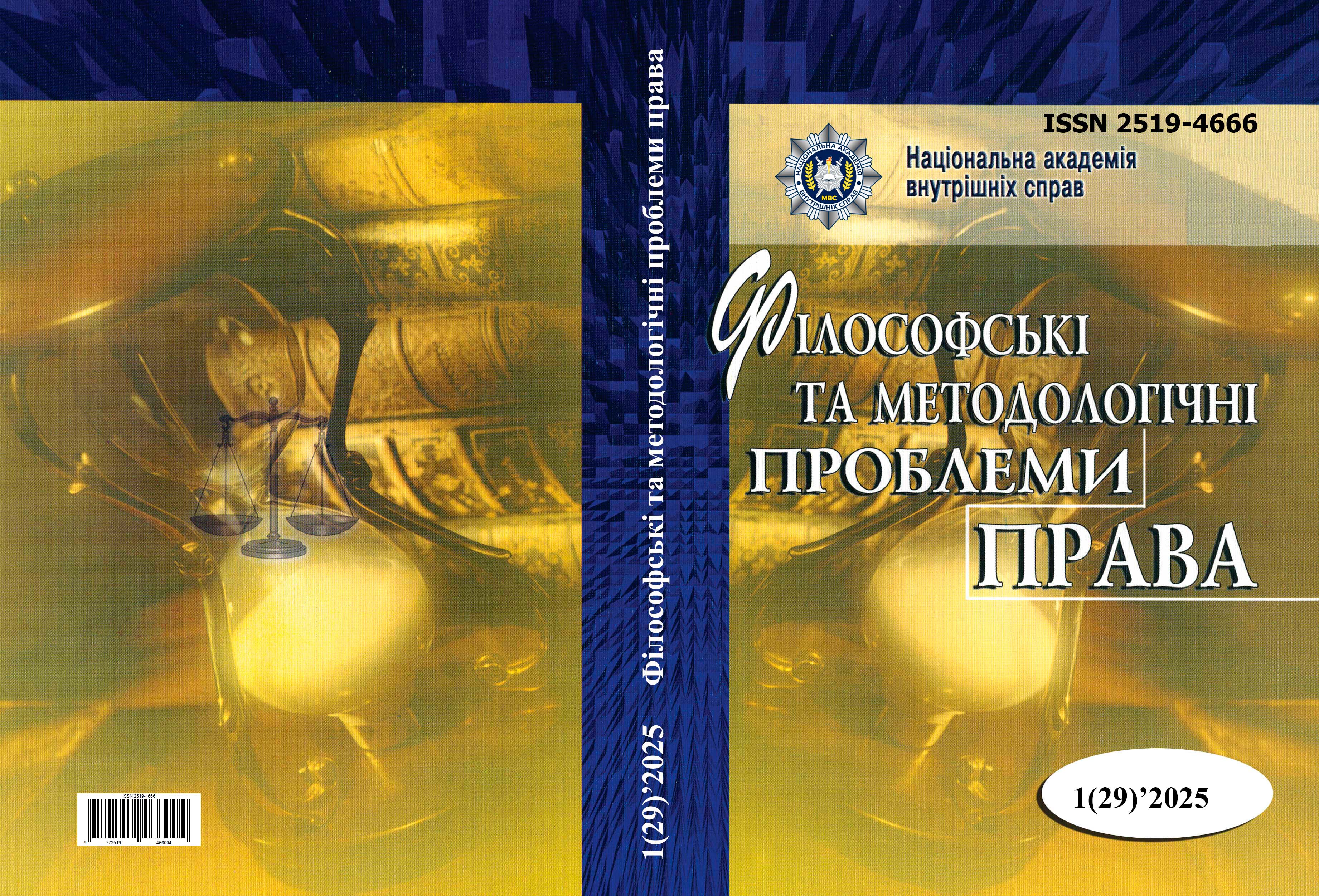Правове регулювання в інформаційному просторі в контексті цифрового гуманізму як компенсація недотримання норм інформаційної етики та цифрового громадянства
Анотація
Анотація. Статтю присвячено питанням урегулювання поведінки в інформаційному просторі. Висвітлено, що інформаційний простір є специфічним простором, який створений людиною. Він є наймолодшим із п’яти просторів, у яких реалізується людина суспільна, однак охоплює інші чотири. Функціональне призначення інформаційного простору полягає в тому, що він робить можливим і спрощує міжіндивідне спілкування, а також є середовищем поширення інформації. З культурологічного погляду виникнення, формування та функціонування інформаційного простору є закономірним процесом реагування на кардинальні сучасні соціальні зміни, як було з винаходом письма, книгодрукуванням, радіо і телебаченням, які мали видимі ландшафтні наслідки для всієї культури. Розвиток технологій нині змінює спосіб життя й повсякденні поведінкові алгоритми, а також формує новий тип людини – людину цифрову та нові модуси людини, що впливає на модифікацію усталених соціальних явищ, якими є громадянство, гуманізм, етика. Тому в умовах сьогодення цілком коректно говорити про «цифрове громадянство», «інформаційну етику» та «цифровий гуманізм», що підкреслює онтологічні зміни в соціальному житті, модифікацію принципів і правил поведінки індивідів, формування й функціонування нових індивідуальних та суспільних принципів і правил, що відбувається внаслідок руйнування або апгрейду традиційних культурних звичаїв, норм моралі тощо. Спільним для цифрового громадянства, інформаційної етики й цифрового гуманізму є те, що вони передбачають відповідальну поведінку особи в цифровому світі, яку слід вибудовувати на усвідомлених моральних принципах. У разі відсутності такої усвідомленої поведінки й недотримання певних правил поведінки має бути застосовано правове регулювання.
Ключові слова: інформаційний простір; людина цифрова; користувач; особа; інформаційна етика; цифровий гуманізм; цифрове громадянство; цифровий космополітизм; інформаційна безпека; цифрове право; спілкування; правове регулювання; право.
Завантаження
Посилання
Andriichenko, Zh., Blyzniuk, T., & Maistrenko, O. (2021). DIGITAL etiquette and communications: trends and requirements of the present. Economy and Society, 34. DOI: 10.32782/2524-0072/2021-34-24
Dubov, D.V. (2014). Cyberspace as a new dimension of geopolitical rivalry. Kyiv: NISD.
Floridi, L. (2013). The Ethics of Information. Oxford: Oxford University Press.
Jenkins, H., Shresthova, S., & Gamber-Thompson, L. (et al.). By Any Media Necessary: The New Youth Activism. New-York: New York University Press.
Koliada, I.H. (2023). "Robinsons" of the digital world. Cultural almanac, 1, 121-126. DOI: 10.31392/cult.alm.2023.1.16
Kushakova-Kostytska, N.V., & Serdiuk, I.V. (2016). Information society: essence and main conceptual approaches. Philosophical and methodological problems of law, 1(11), 139-153. Retrieved from https://philosophy.navs.edu.ua/index.php/philosophy/article/view/389
Marshall, T.H. (1950). Citizenship and Social Class. Citizenship and Social Class and Other Essays (pp. 1-85). Cambridge: University of Cambridge Press.
Myliubenko, H. (2011). The place and role of communities in Internet communication. Gileya, 45(3), 311-318.
Negroponte, N. (2015). Being digital. New York: Vintage.
Prensky, M. (2001). Digital Natives, Digital Immigrants. On the Horizon MCB University Press, 9(5). Retrieved from https://www.marcprensky.com/writing/Prensky%20-%20Digital%20Natives,%
Digital%20Immigrants%20-%20Part1.pdf
Protsenko, O., Chubina, T., & Dmytrenko, D. (2022). Ethics and information ethics in the communicative space of modern society. Visnyk of Lviv University. Series "Philosophical and political studies", 44, 98-104. DOI: 10.30970/PPS.2022.44.11
Razmietaieva, Yu. (2020). Digital human rights and problems of extraterritoriality in their protection. Law and public administration, 4, 18-23. DOI: 10.32840/pdu.2020.4.2
Shmit, K., & Koen, D. (2019). The new digital world. How technologies change the state, business and our life. Lviv: Litopys.
Trebin, M.P. (2024). Digital society: general characteristics. Ukrainian society: socio-humanitarian analysis of the present and forecast of the future: materials of the XXVI All-Ukrainian scientific-practical conference (pp. 24-35). Kharkiv: Pravo.
Vanh, D. (2023). Digital culture: features and its main characteristics. Current problems of philosophy and sociology, 41, 15-21. DOI: 10.32782/apfs.v041.2023.3
Voronkova, V., Kyvliuk, O., & Andriukaitene, A. (2023). Evolution from active responsible citizenship to digital in the context of critical thinking: the experience of EU countries. Humanities Studies, 14(91), 23-34. DOI: 10.32782/hst-2023-14-91-03
Voronkova, V.H., & Nikitenko, V.O. (2020). Culture and civilization: interaction and relationship in the context of social and philosophical analysis. Humanities Studies, 3(80), 49-60. DOI: 10.26661/hst-2019-3-80-04
Voronkova, V.H., & Nikitenko, V.O. (2022). Philosophy of the digital person and digital society: theory and practice. Lviv-Toruń: Liha-Press.
Vovk, V.M. (2022). Quasi-subjects of law: problems of theory and practice. Moderní aspekty vědy: XXVI. Díl mezinárodní kolektivní monografie (pp. 324-352). Česká republika: Mezinárodní Ekonomický Institut s.r.o.
Vovk, V.M. (2025). Information ethics and security in the information space. International humanitarian law and the foundations of security in times of armed conflicts: materials of the International Scientific and Practical Conference. conference (pp. 529). Kyiv: Kyiv. In-t Nats. hvardii Ukrainy.
Wu, Z.Y., Zhou, G.H., Liu, X.D., & Du, J.F. (2022). Media Perspective Analysis of Alienation in Interpersonal Communication in the New Media Era. Chinese Newspaper Industry, 4, 22-23.
Переглядів анотації: 136 Завантажень PDF: 112
Авторське право (c) 2025 Філософські та методологічні проблеми права

Ця робота ліцензується відповідно до Creative Commons Attribution-NonCommercial-NoDerivatives 4.0 International License.
- Автори залишають за собою право на авторство власної праці та передають журналу право першої публікації цієї роботи на умовах ліцензії Creative Commons Attribution License, яка дає змогу іншим особам вільно розповсюджувати опубліковану працю з обов’язковим посиланням на авторів оригінальної роботи та першу публікацію статті в цьому журналі.
- Автори мають право укладати самостійні додаткові угоди щодо неексклюзивного розповсюдження роботи у тому вигляді, в якому вона була опублікована в журналі (наприклад, розміщувати статтю в репозитарії установи або публікувати у складі монографії), за умови збереження посилання на першу публікацію роботи у цьому журналі.
- Політика журналу дає змогу і заохочує розміщення авторами в Інтернеті (наприклад, у електронних сховищах установ або на особистих веб-сайтах) рукопису статті як до подання цього рукопису до редакції, так і під час його редакційного опрацювання, оскільки це сприяє продуктивній науковій дискусії та позитивно впливає на оперативність та динаміку цитування опублікованої роботи.




